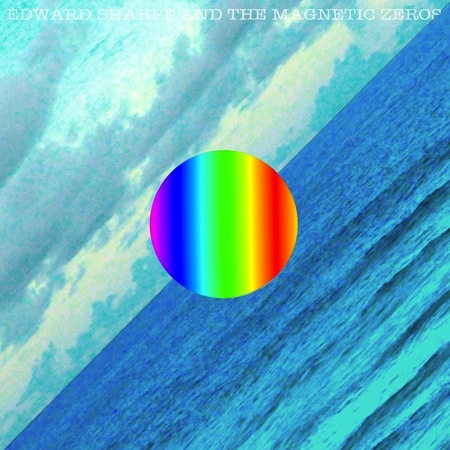I’ve always been fond of continuity with album titles. With the possible exception of Led Zeppelin, such can tell you a lot about the artist and what they want their music to express. Alex Ebert and nine Los Angeles musicians arrived as Edward Sharpe and the Magnetic Zeros in 2007. Two years removed from their serendipitous formation, the collective released their crowd-pleasing debut. It was an ascension that radiated positivity and focused on simple pleasures. Now that the band has surfaced, there’s Here, and after the throat clearing that was Up From Below, Sharpe and the Zeros believe their time is now.
Here is roomier; these songs are deep exhales. Ruminative but never ponderous, every member seems dedicated to their craft here. However, it’s debatable exactly what craft that is. So many voices and styles clash, and there’s no real glue holding it all together. Several of the songs are quite strong on their own, but aside from an old school, Deep South back porch ambiance and lyrics steeped in theology, there isn’t much linking any of them together. “Man on Fire” smoulders with tinges of bluegrass and rockabilly, with Sharpe channeling his best Johnny Cash. After comes “That’s What’s Up,” a punchy, upbeat number that dares you not to tap your toes. The merits of both are obvious enough, but as a one-two intro to the record, it sends a mixed message.
The themes of religion and faith are explored frequently. With a refrain of “I love my god/ God made love,” “I Don’t Wanna Pray” sighs piously, with several of the Zeros pitch in vocal duties. “Dear Believer” flirts with the contrived lyrically, but the strength of its melody and Ebert’s heartfelt performance go a long way to redeeming it. Ebert sounds his politest on “All Wash Out,” a minimal arrangement of finger-plucked guitar, soft piano, snapping fingers and a crescendo of horns that endow the track with a genuine tenderness.
One of the album’s strongest tunes is also one of its most understated. With its faint instrumentation, “Child” relies on the power on storytelling and melody. So does “One Love to Another,” which, despite being an ensemble piece, feels as intimate as anything on the record. Blessed with an old-fashioned FM radio charm, Here is a worthy follow-up.

